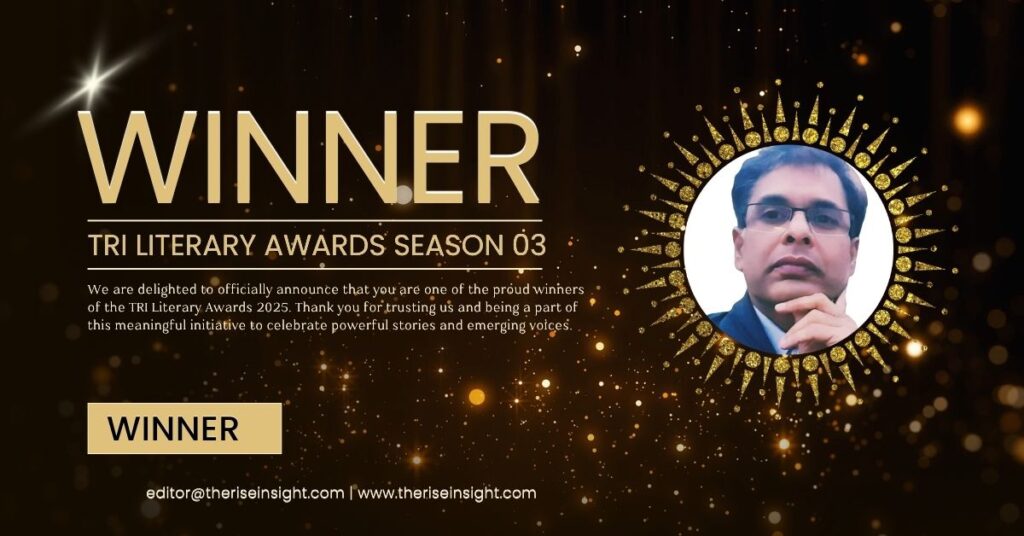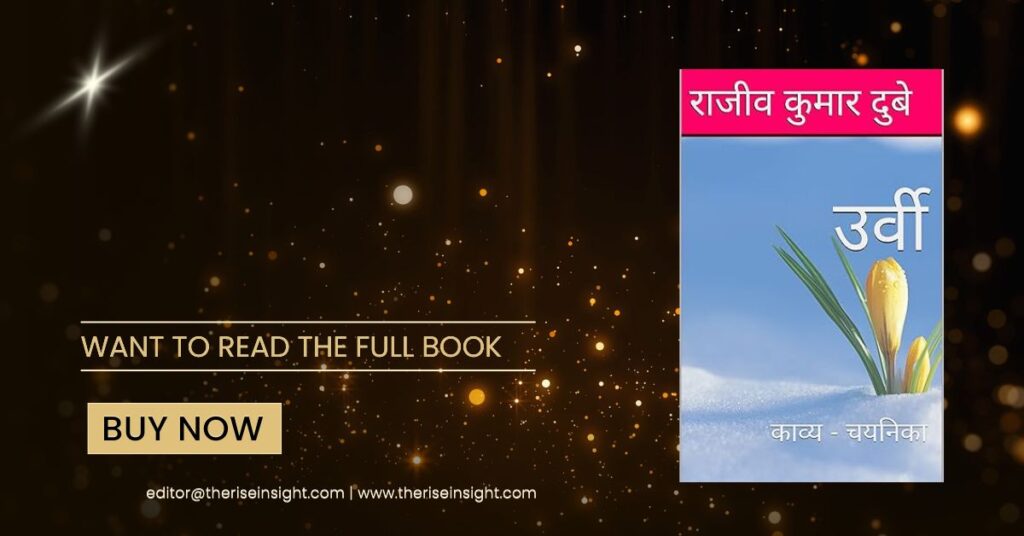
The Rise Insight is elated to extend its warmest and proudest congratulations to Professor Rajeev Kumar Dubey, whose exceptional anthology Urvi has been honored as the winner of the TRI Literary Awards 2025 (Season 03) in the poetry category. This accolade stands as a testament to his unparalleled contribution to Indian literature, where poetic brilliance seamlessly meets philosophical wisdom and national consciousness.
Having had the privilege of reading Urvi, I must begin by confessing—this is not just a poetry collection; it is a spiritual and intellectual odyssey, a profound mirror reflecting both the soul of India and the conscience of humanity.
🌍 Urvi: Poetry as a Pilgrimage
Urvi—aptly titled after Mother Earth—is a literary hymn that resounds with echoes of ancient Indian wisdom while calling attention to the urgent dilemmas of the modern world. It is a rare collection where literature, spirituality, nationalism, ecology, ethics, and activism converge to create a lasting impact. Through more than a hundred pages of poetic thought, Rajeev Kumar Dubey does not merely write poetry; he channels the collective voice of a civilization—its anguish, its hope, its pain, and its pride.
The first striking aspect of Urvi is its deeply Indian soul. Every verse carries the fragrance of native soil and the solemnity of Vedic thought. Readers well-versed in Indian philosophy and culture will find immense joy in the references to the Ramcharitmanas, Bhagavad Gita, Vedas, and the Bhakti movement, but what truly elevates the experience is the way Dubey rejuvenates these timeless themes to address contemporary crises.
🧠 A Thoughtful Fusion of Elements
The poems move gracefully between austerity and abundance, oscillating between the voice of a rishi, a reformer, a revolutionary, and a healer. One poem may delve into spiritual awakening, another into political degeneration, and yet another into the unspeakable pain of female foeticide or environmental destruction—but the poet’s voice remains unwaveringly honest and compassionate throughout.
There is a noticeable rhythm to his composition that mirrors the cadence of classical Sanskrit meters, yet he maintains a modern accessibility that welcomes every kind of reader. His words are adorned not for decorative purposes, but to evoke moral clarity and collective awakening.
Dubey also incorporates scientific and historical insights into his poetry—something remarkably rare among contemporary Indian poets. His lines are not only rich in imagery and metaphor, but also in data, socio-political context, and medical truth—making the anthology an exemplary case of what it means to be multidisciplinary in thought and expression.

💔 The Personal Is Political—and Poetic
Several poems in Urvi confront the realities of modern India—from poverty and malnutrition to political betrayal, religious hypocrisy, and environmental collapse. These verses are not composed with anger, but with a sorrowful resolve, like a sage who has seen too much but still chooses to hope. Dubey’s treatment of female oppression and foeticide is especially haunting. He doesn’t just highlight the pain—he demands reflection and reformation.
What strikes the reader most is the range of emotion in the poetry. You will find verses soaked in anguish, but also ones radiating with light, peace, and transcendence. He mourns the degradation of dharma but also sings of revival, urging society to return to the roots of ethics and empathy.
🌱 Nature, Nation, and the Feminine Divine
Rajeev Kumar Dubey’s environmental consciousness flows through every page of Urvi. Nature isn’t merely a backdrop—it’s the central deity of his poetic universe. Trees, rivers, mountains, skies, and the Earth herself are not just living beings but moral witnesses to human failure and spiritual decay.
Mother Earth is not passive in these poems—she is wounded, waiting, and watching. The anthropomorphic portrayal of Earth as the nurturing yet tormented mother draws a sharp emotional edge. Dubey is not pleading for superficial climate action; he is urging a transformation of consciousness, a return to reverence—a theme that deeply resonates in our ecologically unstable times.
Furthermore, Dubey’s verses about women empowerment are stirring and bold. He does not view women through the lens of idealism alone but as agents of spiritual and social revolution, reclaiming their place in a culture that has too often turned patriarchal in practice despite being matriarchal in tradition.
🕊️ A Call for Universal Peace and Inner Awakening
Many poems in Urvi feel like invocations or mantras, written in a style that evokes the energy of chants—yet always grounded in present-day relevance. His message is consistent: inner awakening leads to national awakening. He draws a straight line between the individual’s moral clarity and the nation’s ethical compass.
In a world growing increasingly fragmented, Urvi offers a poetic proposition for universal brotherhood, scientific humility, and spiritual courage. His calls for global harmony are not utopian dreams but well-reasoned insights backed by philosophical depth and practical wisdom.
✍️ Language, Imagery, and Craftsmanship
Rajeev Kumar Dubey’s command of language is extraordinary. His diction is classical yet contemporary, elevated yet empathetic. His imagery is rich, vivid, and unforced. The poetic craft does not come across as artificial or ornamental; instead, it flows with a natural cadence that speaks to both the learned and the layperson.
He uses metaphor as both revelation and rebellion, and in doing so, his poetry becomes a powerful tool of resistance and realization. Whether invoking the sacred rivers or forgotten voices, he ensures that every reader feels included in the conversation.
Here are the individual feedback from all nine reviewers after reading Urvi by Professor Rajeev Kumar Dubey:
1. Prashant Sahu:
“Urvi is not just a poetry collection—it’s a soulful expression of India’s cultural and spiritual core. I was deeply moved by the way Professor Dubey connects national integrity with human values through verses. His poetry has the power to awaken the inner conscience and ignite a sense of responsibility towards society and nature.”
2. Sameer Gudhate:
“Reading Urvi was an enlightening experience. Each poem feels like a meditation on humanity and existence. The themes of universal brotherhood and the stark realities of modern exploitation struck a deep chord. It’s rare to find poetry that is both so aesthetically rich and socially powerful.”
3. Apeksha Gupta:
“I was spellbound by the poetic brilliance of Urvi. The use of vivid imagery and philosophical reflection is outstanding. As a woman, I found the verses on female empowerment and foeticide especially touching and courageous. The poet speaks with truth, clarity, and deep compassion.”
4. Akansha Sinha:
“Urvi bridges ancient wisdom with contemporary struggles so seamlessly. From ecological concerns to the degradation of ethics, Professor Dubey’s poetry raises important questions and leaves a lasting imprint on the reader’s mind. His work inspires deep thought and personal reflection.”
5. Glenville Asbhy:
“As someone who values global peace and cultural dialogue, I found Urvi to be an extraordinary literary contribution. It transcends boundaries, addressing the universal concerns of human dignity, spirituality, and environmental care. A powerful poetic voice rooted in Indian tradition yet globally relevant.”
6. Pooja Sahu:
“I felt every word in Urvi like a prayer for humanity. The poems do not shy away from exposing the painful truths of society, yet they radiate hope and a vision for a better world. It is poetry with purpose, wisdom, and unwavering emotional intensity.”
7. Versha Singh:
“Professor Dubey’s Urvi is a poetic masterpiece that serves as a moral compass. His verses on nationalism, ethics, and spiritual awakening are much needed in today’s fragmented world. The blend of lyrical beauty with grounded reality makes this book unforgettable.”
8. Shivangi Yadav:
“I was completely absorbed in the depth of Urvi. The way it touches upon forgotten truths, our treatment of nature, and our cultural heritage is incredibly moving. The poet has an extraordinary way of making readers think deeply while still enjoying the elegance of his language.”
9. Kavita Kaushik:
“Urvi is a deeply human and heartfelt work. It challenged me, consoled me, and inspired me all at once. Whether it was the portrayal of India’s socio-political issues or the reverence for Mother Earth, every poem felt personal and powerful. A truly impactful literary work.”
🌟 Final Reflections
Reading Urvi is not an escape—it is a return: to truth, to ethics, to empathy, and to Earth. It is rare to find a collection that embodies scientific clarity, spiritual honesty, and poetic beauty with such coherence and integrity.
Professor Rajeev Kumar Dubey stands not just as a poet of excellence, but as a visionary voice in Indian literature. His dual identity as a medical professional and a literary thinker adds profound weight to his work—he does not merely diagnose physical ailments; he also treats the soul of society through his words.
Urvi is a book that deserves to be read in schools, debated in literary circles, and remembered in history as a poetic scripture of conscience.
Once again, congratulations to Professor Rajeev Kumar Dubey for this well-deserved honor. May Urvi continue to inspire generations to think deeper, feel more compassionately, and live more truthfully.

